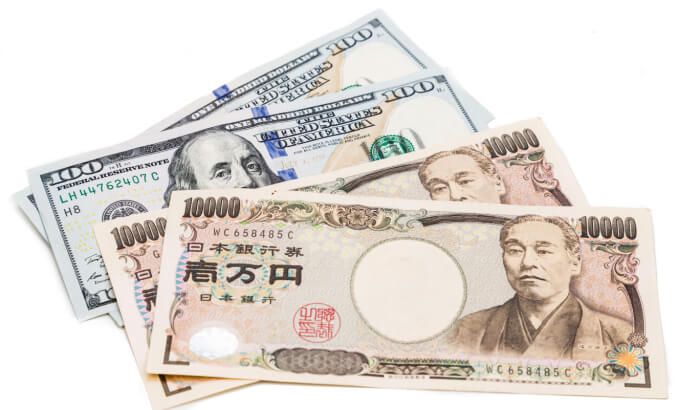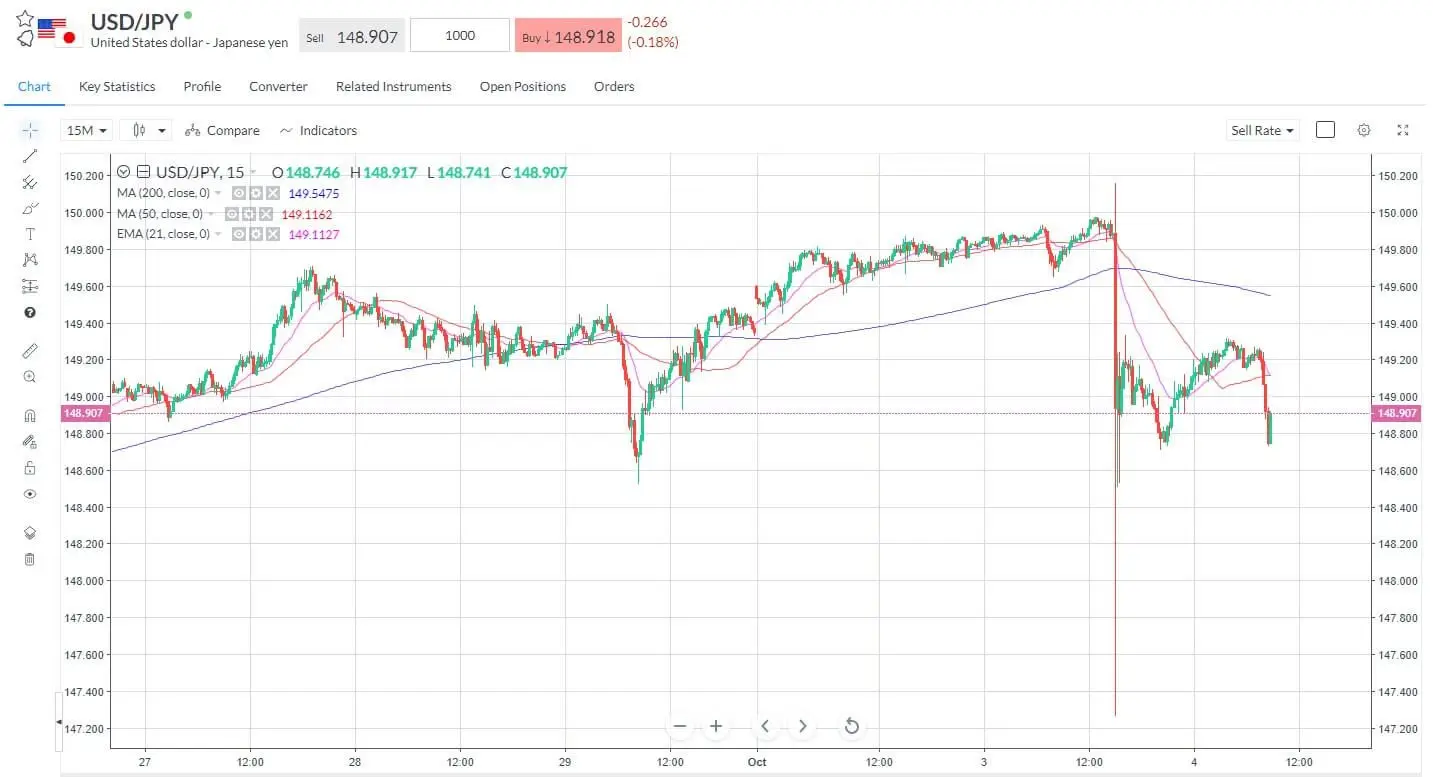
Thursday Oct 5 2023 08:55

9 min

The Japanese yen (USD/JPY) steadied around 149 per dollar as of Wednesday, following a knee-jerk drop from 150.15 to 147.3 in the previous session that raised concerns of potential government intervention to support the national currency.
The currency strengthened by 1.7% against the dollar to trade at 147.3 late on Tuesday, but subsequently retraced most of those gains as better-than-anticipated U.S. jobs data reinforced the expectation that the Federal Reserve would maintain interest rates "higher for longer.”
Finance Minister Shunichi Suzuki recently issued a cautious warning about monitoring currency movements, saying he was watching forex markets “with a strong sense of urgency”. Japanese authorities intervened in the currency markets for the first time since 1998 last year when the yen fell to 145.9.
Throughout this year, the yen has seen a significant decline, driven by the Bank of Japan's (BoJ) unwavering commitment to an ultra-easy monetary policy, even as other major central banks embarked on an aggressive tightening trajectory. The U.S. Federal Reserve’s hiking cycle has brought the dollar close to a one-year high, with the DXY — an index measuring the greenback’s weight against six other major currencies, including the yen — projected to potentially breach the 108 mark in the near future by multiple analysts.
Calculate your hypothetical required margin for a Forex position, if you had opened it now..
Category

Instrument


Bid
Ask
Account Type
Direction
Quantity
Amount must be equal or higher than
Amount should be less than
Amount should be a multiple of the minimum lots increment
USD
EUR
GBP
CAD
AUD
CHF
ZAR
MXN
JPY
Leverage
Required Margin
Required Margin
Current conversion price:
Past performance is not a reliable indicator of future results.
In an overview on Wednesday, Markets.com Chief Market Analyst Neil Wilson was fairly certain of the BoJ’s intervention in the dollar to yen rate:
“USD is bid with DXY tapping on 107 now and the yen briefly breaching 150 before a seismic adjustment on surely some kind of BoJ intervention – from 150 to 147.3, last trading a little below the 149 level.
Tora tora tora: spot where the BoJ likely dived in.”

Chris Turner, Global Head of Markets at Dutch bank ING, said the drop “had all the hallmarks of intervention” but stopped short of a definitive verdict. According to Turner, the rise in the yen may have been triggered by market players selling off their positions:
“There is much speculation over whether Japanese authorities intervened yesterday afternoon to sell USD/JPY. The flash crash from 150.15 to 147.30 had all the hallmarks of intervention, although Tokyo has failed to publicly confirm that it either 'checked rates' (a precursor to intervention) or indeed sold dollars. During last year's FX intervention campaign where the BoJ sold $70bn through September and October, Tokyo was happy to confirm intervention and did so in a reasonably noisy way. Tokyo's silence now may indeed suggest they didn't intervene and the sharp sell-off could have possibly been caused by re-positioning after option barriers in USD/JPY were hit at 150.
As above, there are no signs that US Treasury yields are near a peak meaning that even if intervention took place, USD/JPY could still go higher. For example, last year's intervention started at 146 in September and did not stop USD/JPY trading to 152 in October. However, we would say that the difficult external environment and the unwind of the carry trade will give the yen some support on the crosses. And investors will also be reluctant to chase USD/JPY up through 150 near term.”
In their dollar to yen forecast, Economists at Frankfurt-based Commerzbank said that interventions do little to change the fundamental situation surrounding the Japanese currency:
“Japanese officials unanimously refused to confirm any FX intervention. Instead, they continued to emphasize their readiness to react to ‘excessive movements’.
In any case, Tuesday's exchange rate movement will reinforce the impression among market participants that the 150 in USD/JPY is a sound barrier that is difficult to break through.
Ultimately, however, interventions do little to change the fundamental situation. As long as the US economy continues to appear robust and the BoJ does not seek an exit from its ultra-expansive monetary policy, there are fundamental reasons for an upward trending USD/JPY. FX interventions will do little to change this. If the MOF nevertheless continues to intervene, an attrition battle could loom, with the currency market repeatedly testing the 150 mark and the MOF reacting accordingly. The next few days are likely to remain exciting.”
The USDJPY forecast from Societe Generale also saw the yen remaining vulnerable against the dollar going forward, saying the yen wouldn’t be able to “retreat in a durable fashion”:
“The conundrum the BoJ finds itself in is that intervention right now is a battle it can’t win.
In any case, Tuesday's exchange rate movement will reinforce the impression among market participants that the 150 in USD/JPY is a sound barrier that is difficult to break through.
USD/JPY is unlikely to retreat in a durable fashion until the bank tightens policy or the cap comes off 10y JGB yields. Or US bond yields stabilise or (ideally) retreat. In short, it could get worse for the Yen before it gets better.
USD/JPY retreated from 151.95 to 135 a year ago after $43bn of USD sales, but the success was partly explained by the 50 bps drop in 2y UST yields and unexpected change in YCC settings in December. The BoJ may have checked FX rates on Tuesday with dealers, but we would not be surprised if actual selling of USD is delayed until Friday, or Monday morning during Asian trading hours, when US payrolls will have been published.”
In a longer-term USDJPY prediction, economists at Nordea echoed the sentiments from Societe Generale and Commerzbank, forecasting the yen to weaken in the short term. According to Nordea, the dollar to yen rate will maintain at 150 within the next three months, and scale back to 140 by the end of 2024.
The bank’s yen forecast for 2025 saw the currency trading at 130 against the dollar:
“The government’s verbal intervention threats have curbed the fall of the JPY but are not sufficient to turn JPY fortunes. Even with a high likelihood of intervention, we see further Yen weakening in the short term.
We still expect that a reversal is in the cards longer term – that is more likely to occur when major central banks turn dovish rather than the BoJ turning hawkish.
USD/JPY – 3M 150 Mid-2024 145 End-2024 140 Mid-2025 130.”
At the time of writing, the U.S. dollar index, or DXY, was trading at 106.87 (down 0.12% on the day), while the dollar to yen rate traded at 148.87, as per MarketWatch data.
When considering foreign currency (forex) for trading and price predictions, remember that trading CFDs involves a significant degree of risk and could result in capital loss.
Past performance is not indicative of any future results. This information is provided for informative purposes only and should not be construed to be investment advice.
Asset List
View Full ListLatest
View all
Thursday, 20 February 2025

8 min

Thursday, 20 February 2025

5 min

Thursday, 20 February 2025

2 min



